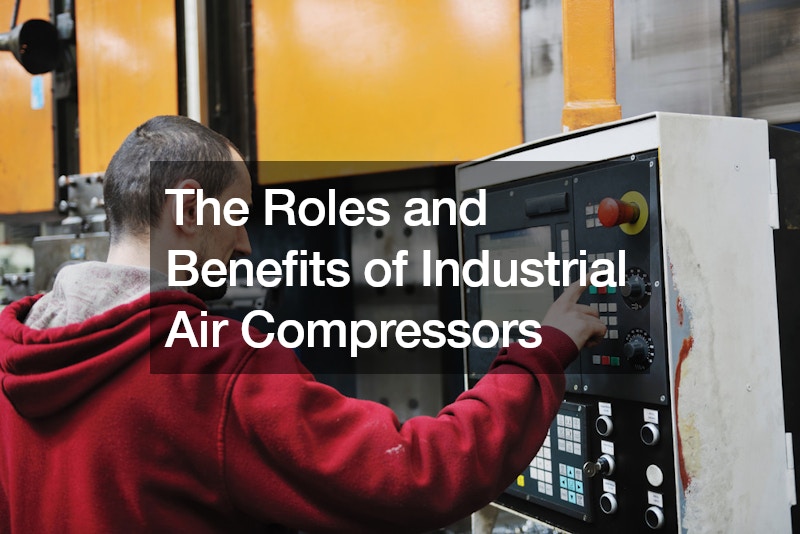Industrial air compressors play pivotal roles across various sectors, from manufacturing and construction to healthcare and transportation. These devices are instrumental in converting power into potential energy stored in pressurized air, facilitating a wide range of applications. Let’s delve into the roles and benefits of industrial air compressors, exploring their types, components, and the advantages they offer to different industries.
Understanding Industrial Air Compressors
Types of Compressors:
The two main types of industrial air compressors are positive displacement compressors and dynamic or centrifugal compressors. Positive displacement compressors trap gas and reduce its volume to increase pressure. Reciprocating compressors, rotary screw compressors, and scroll compressors are common examples of positive displacement compressors. On the other hand, dynamic compressors use rotating impellers to accelerate gas flow, converting kinetic energy into pressure.
Key Components:
Regardless of type, industrial air compressors typically consist of essential components such as cylinders, pistons, impellers, intercoolers, aftercoolers, receivers, safety valves, and auxiliary devices like oil separators and desiccant dryers. These components work together to compress, cool, store, and regulate compressed air within the system.
Roles of Industrial Air Compressors
Manufacturing and Construction:
In manufacturing and construction, industrial air compressors are indispensable for powering pneumatic tools and machinery. From air-powered drills and nail guns to pneumatic conveyors and spray painting equipment, compressed air drives a wide array of processes, enhancing efficiency and productivity on job sites and assembly lines.
Healthcare and Pharmaceuticals:
In healthcare facilities and pharmaceutical laboratories, industrial air compressors are vital for providing clean, compressed air for medical equipment, such as ventilators, dental chairs, and surgical tools. Compressed air systems with precise filtration and drying capabilities ensure sterile conditions and prevent contamination in sensitive environments.
Transportation and Automotive:
The automotive industry relies on industrial air compressors for various applications, including tire inflation, pneumatic braking systems, and paint spraying in vehicle manufacturing. Compressed air-powered tools enable efficient maintenance and repair tasks in automotive workshops, enhancing service quality and turnaround times.
Energy and Utilities:
In the energy sector, industrial air compressors play crucial roles in gas processing, pipeline transportation, and power generation. They help maintain optimal pressure levels in gas pipelines, control pneumatic valves and actuators, and support combustion processes in power plants, ensuring reliable energy supply and operational efficiency.
Benefits of Industrial Air Compressors
Versatility and Flexibility:
Industrial air compressors offer versatility, allowing for a wide range of applications across diverse industries. Their adaptability to different operating conditions and power requirements makes them indispensable assets in dynamic industrial environments.
Efficiency and Productivity:
By providing a continuous source of compressed air, industrial air compressors enhance operational efficiency and productivity in manufacturing, construction, and other sectors. Air-powered tools and equipment enable faster assembly, fabrication, and finishing processes, reducing production lead times and labor costs.
Cost-effectiveness and Sustainability:
Industrial air compressors offer long-term cost savings by reducing energy consumption, minimizing material waste, and optimizing process efficiency. Modern compressor technologies incorporate energy-efficient designs, variable-speed drives, and intelligent control systems to enhance sustainability and reduce carbon footprints.
Reliability and Safety:
Industrial air compressors are engineered for durability, reliability, and safety, adhering to stringent quality standards and regulatory requirements. Regular maintenance and servicing ensure optimal performance and prevent downtime, minimizing operational disruptions and safety risks in industrial facilities.
Emerging Technologies and Innovations:
The industrial air compressor sector continues to evolve with advancements in technology and innovation. Newer compressor models integrate smart sensors, predictive maintenance algorithms, and remote monitoring capabilities, allowing for proactive equipment management and optimization. Additionally, advancements in compressor design, such as oil-free and variable-speed compressors, contribute to improved energy efficiency, reduced environmental impact, and enhanced reliability in industrial applications.
Customized Solutions and Support Services:
Industrial air compressor manufacturers and suppliers offer customized solutions tailored to specific industry requirements and operational needs. From system design and installation to ongoing maintenance and technical support, comprehensive service offerings ensure seamless integration, optimal performance, and maximum uptime for industrial air compressor systems. Moreover, training programs and educational resources empower personnel to operate and maintain compressors safely and efficiently, fostering a culture of expertise and continuous improvement within organizations.
In essence, the evolution of industrial air compressors reflects a commitment to innovation, sustainability, and customer satisfaction in meeting the diverse needs of modern industries. By embracing emerging technologies, providing tailored solutions, and delivering exceptional support services, industrial air compressor providers pave the way for enhanced efficiency, reliability, and success across industrial sectors.
In conclusion, industrial air compressors play multifaceted roles in various industries, driving efficiency, productivity, and innovation. From manufacturing and healthcare to transportation and energy, these versatile devices continue to revolutionize industrial processes, offering a myriad of benefits in terms of performance, cost-effectiveness, and sustainability. As industries evolve and embrace technological advancements, industrial air compressors remain indispensable assets, powering progress and driving economic growth globally.
.

